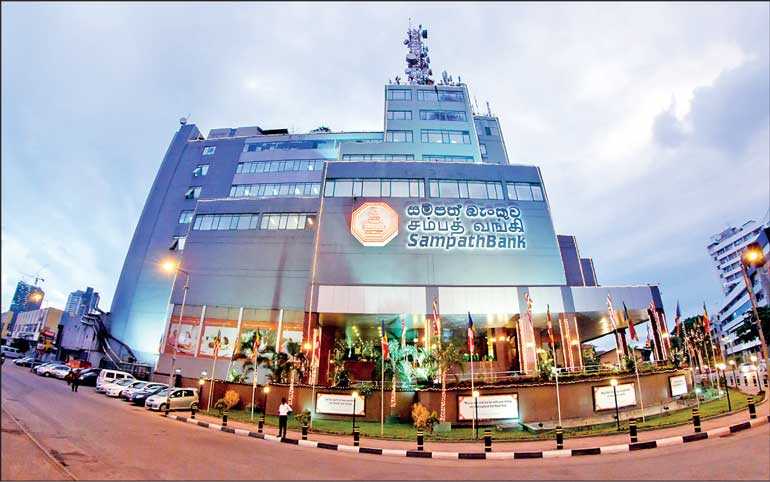Monday Feb 23, 2026
Monday Feb 23, 2026
Saturday, 13 February 2021 00:30 - - {{hitsCtrl.values.hits}}

Sampath Bank
|
Rienzie T Wijetilleke
|
Following is a reply to Rienzie Wijetilleke by the Sampath Bank Retired Executives Association (SBREA) on the article titled ‘Sampath Bank take-over: A golden opportunity missed due to communal mindsets’ by Rienzie Wijetilleke and Kusum Wijetilleke published in the Daily FT on 16 January
We are surprised and confused why Mr. Rienzie Wijetilleke (RW) has chosen this as the right time to write this article after a lapse of 20 years of the incident of the failed attempt of HNB to take-over Sampath Bank (SB) in a hostile and unlawful manner.
Anybody who is aware of the full story knows that there was no reference whatsoever to a ‘Tamil’ bank taking over a ‘Sinhala’ bank as misinterpreted by RW in his article. It is purely his own imagination and such a misconception was never in the minds of those who defended SB within and outside the organisation.
According to RW, HNB was not of an adequate size to be considered as a major financial player, internationally. As stated by RW, HNB’s sole intention was to be a regional giant in the banking industry by enhancing their ‘much smaller deposit base’ and to ‘grow themselves to be a regional powerhouse’.
Though RW attempted to justify their course of invasive action as a pure business strategy with a view to improve the size and the quality of the local banking industry by comparing the size and quality of leading local bankers with the global giants, we being the ex-employees of SB have timely and correctly visualised HNB’s conspiring move as an attempt to destroy their much loved and budding yet revolutionary bank at its infancy.
In case RW’s attempt was a pure business strategy as declared by him, they should have liaised with another bank of a bigger size viz. Commercial Bank of Ceylon PLC, for a friendly merger, without resorting to acquire a tiny bank of the calibre of SB which was then at its infancy.
Looking at the long-time, well-knitted attempt conspired by HNB and its subsidiaries, HNB in addition to their own investments at the shares of SB, had also misused a company formed for the exclusive purpose of the construction and the maintenance of their headquarters building, to purchase the shares of SB.
Also HNB in hand with the companies of Mr. Harry Jayawardane who was then the Deputy Chairman of HNB have acquired a large slice of the shares of SB in a very illegal and a systematic manner violating the limitations and the guidelines of Central Bank of Sri Lanka (CBSL) stipulated for the purpose of acquisition and/or merging banking institutions, the Banking Act and as well as the constitution of SB.
HNB whose shares were held by a handful of individuals (mainly the members of Cooray family and their close associates) has never imagined that SB will be able to mobilise easily their shareholders within such a short span of time.
Unexpectedly, the well-planned hostile takeover of SB by HNB proved to be a flop within a very short period of time, as it became a national issue soon. Employees of SB have successfully contested against the move of HNB not only in public forums and media but also in the courts of law.
Failure of conspired attempts to takeover SB
When all his conspired attempts have failed not only due to the strong protests by the general public, employees and customers of SB but also owing to the ruling of the court of law and the determinations of the regulator, finally RW had to cry loudly and confess begging for mercy as follows:
a. At the time, it was his expectation that the regulatory authority would have backed the creation of a Sri Lankan regional financial entity, given the obvious advantages it would bring to Sri Lanka. However, during the initial negotiations, it became apparent that the hearts and minds of so many Sri Lankans had been poisoned and there was resistance from unexpected quarters.
b. In his article, probably in an attempt to seek the sympathy of the readers, RW has finally accused the Sampath Bank Employees Union for their foul play and misbehaviour describing various poster campaigns targeting him personally and the threatening telephone calls received by him and his family members. It is pertinent to mention here that then employees of SB who conducted media briefings in regular intervals have also received several such threatening telephone calls. However, we cannot accuse HNB in this connection for these telephone calls without having sufficient evidence.
c. RW also accused some prominent bankers of that period saying ‘I can state as a fact that I know of some prominent bankers who despite seeing the obvious advantages, did not want to see HNB succeed in their venture’. All these accusations are understandable as neither HNB nor RW has gained anything at the end of the day.
d. RW has further confessed that ‘The pressures were immense, the negative publicity around the merger/acquisition plus my additional responsibilities were starting to take its toll and I could not in good conscience endanger my family any further.’ After reading the final paragraphs of his article, we too have sensed the tragic consequences faced by RW personally as all his supportive conspirators have deserted him, keeping him in isolation.
Conclusion
Thus the opposition to takeover was inevitable and RW and the then Directors of HNB who backed him should blame themselves for a poor investment decision which backfired, without trying to find scapegoats after two decades.
RW appears to be engaged in an exercise to redeem his lost prestige by adding a communal flavour to a monumental blunder which darkened his otherwise illustrious career.